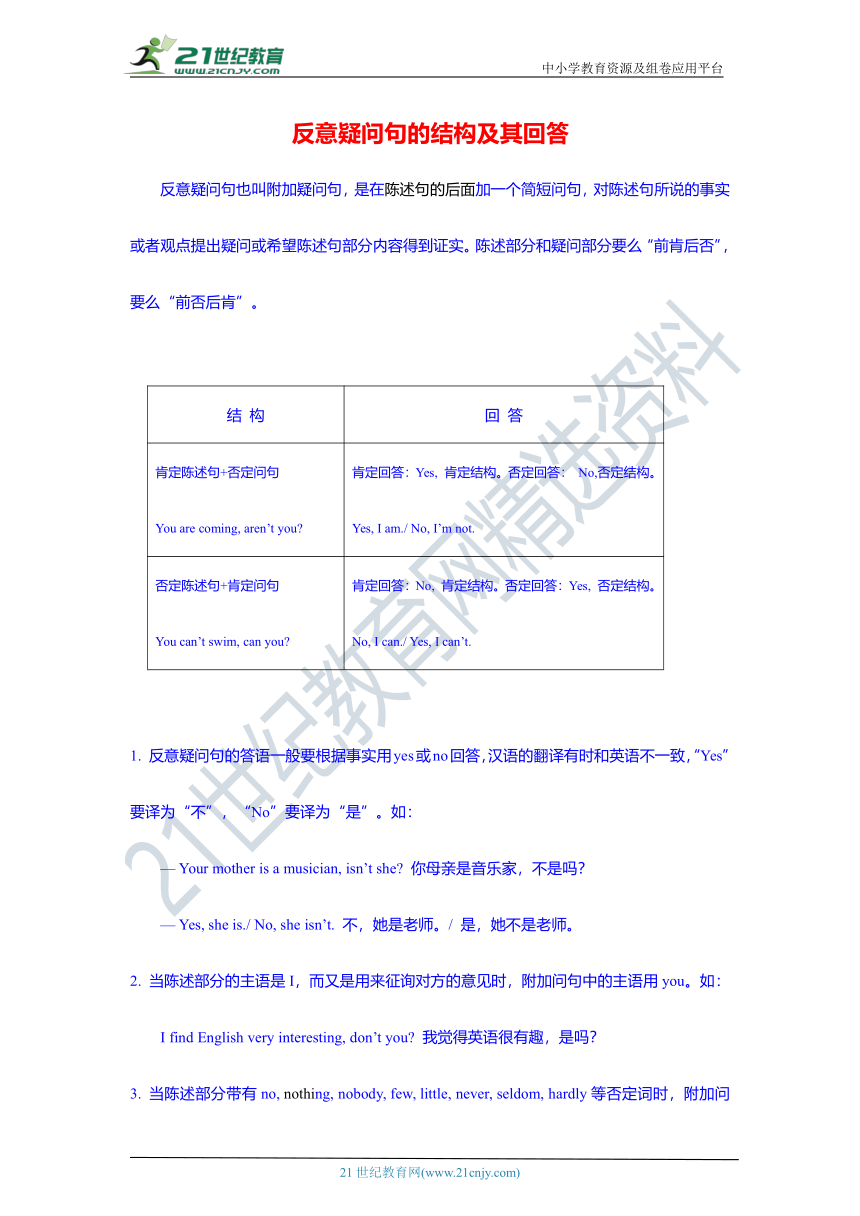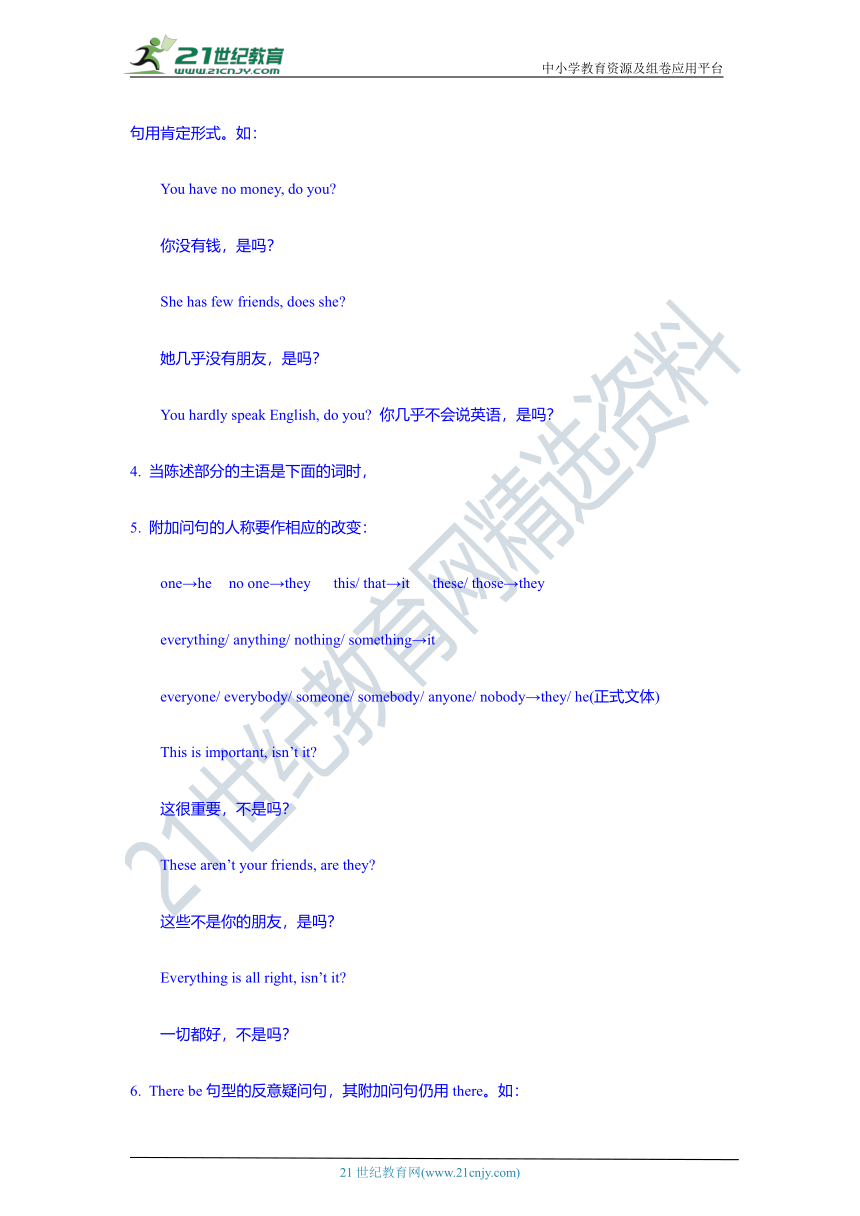中考英语简单句考点详解七:反意疑问句的结构及其回答
文档属性
| 名称 | 中考英语简单句考点详解七:反意疑问句的结构及其回答 |  | |
| 格式 | doc | ||
| 文件大小 | 1.1MB | ||
| 资源类型 | 试卷 | ||
| 版本资源 | 通用版 | ||
| 科目 | 英语 | ||
| 更新时间 | 2021-12-16 11:27:39 | ||
图片预览


文档简介
中小学教育资源及组卷应用平台
反意疑问句的结构及其回答
反意疑问句也叫附加疑问句,是在陈述句的后面 ( http: / / www.21cnjy.com )加一个简短问句,对陈述句所说的事实或者观点提出疑问或希望陈述句部分内容得到证实。陈述部分和疑问部分要么“前肯后否”,要么“前否后肯”。21教育网
结 构 回 答
肯定陈述句+否定问句You are coming, aren’t you 肯定回答:Yes, 肯定结构。否定回答: No,否定结构。Yes, I am./ No, I’m not.
否定陈述句+肯定问句You can’t swim, can you 肯定回答:No, 肯定结构。否定回答:Yes, 否定结构。 No, I can./ Yes, I can’t.
反意疑问句的答语一般要根据事实用yes或no回答,汉语的翻译有时和英语不一致,“Yes”要译为“不”,“No”要译为“是”。如:21·cn·jy·com
— Your mother is a musician, isn’t she 你母亲是音乐家,不是吗?
— Yes, she is./ No, she isn’t. 不,她是老师。/ 是,她不是老师。
当陈述部分的主语是I,而又是用来征询对方的意见时,附加问句中的主语用you。如:
I find English very interesting, don’t you 我觉得英语很有趣,是吗?
当陈述部分带有no, nothi ( http: / / www.21cnjy.com )ng, nobody, few, little, never, seldom, hardly等否定词时,附加问句用肯定形式。如:2-1-c-n-j-y
You have no money, do you
你没有钱,是吗?
She has few friends, does she
她几乎没有朋友,是吗?
You hardly speak English, do you 你几乎不会说英语,是吗?
当陈述部分的主语是下面的词时,
附加问句的人称要作相应的改变:
one→he no one→they this/ that→it these/ those→they www.21-cn-jy.com
everything/ anything/ nothing/ something→it
everyone/ everybody/ someone/ somebody/ anyone/ nobody→they/ he(正式文体)
This is important, isn’t it
这很重要,不是吗?
These aren’t your friends, are they
这些不是你的朋友,是吗?
Everything is all right, isn’t it
一切都好,不是吗?
There be句型的反意疑问句,其附加问句仍用there。如:
There will be a party tomorrow, won’t there
明天有个晚会,是不是?
6. 感叹句后的附加问句的谓语动词需用be的现在时,且常用否定形式。如:
What a clever boy, isn’t he
多么聪明的男孩,他不是吗?
What a cold day, isn’t it
多冷的天,不是吗?
7. Let's引导的反义疑问句,附加问句一般用“shall we ” 如:
Let's go to the zoo, shall we
我们去动物园,好吗?
8. 否定的祈使句,以及表示“请求”的祈使 ( http: / / www.21cnjy.com )句,反意疑问句的附加问句用“will you ”表示“邀请”或“劝诱”的祈使句,附加问句用“won’t you ”如: 【来源:21·世纪·教育·网】
Don’t tell anyone, will you
别告诉任何人,好吗?
Pass me the dictionary, will you
请把字典递给我,好吗?
Join our music club, won’t you
加入我们的音乐俱乐部,好吗?
9. 陈述部分是一个主从复合句,附加问句一般要和主句一致。如:
He said he was late for class, didn’t he 他说他上课迟到了,是吗?
10. 当陈述句的主语是第一人称,谓语动 ( http: / / www.21cnjy.com )词是think, believe, suppose, expect等后接宾语从句时, 附加问句应与从句一致,而且要注意否定转移现象。但当陈述句的主语是第二、三人称时,附加问句应与主句一致。如:www-2-1-cnjy-com
I think he is good at math, isn’t he
我认为他擅长数学,不是吗?
I believe she never speaks English, does she
我相信她从来不说英语,是吗?
He thinks you will come to the meeting, doesn’t he 21世纪教育网版权所有
他认为你会来参加会议,不是吗?
You don’t think it is important, do you
你不认为它重要,是吗?
【考题速递】
单项选择
Professor Tu Youyou ( http: / / www.21cnjy.com ) never stops doing research on Chinese medicine, _______
A. is she B. does she C. isn’t she D. doesn’t she21·世纪*教育网
【答 案】B
【解 析】考查反意疑问句。联系选项可知,本 ( http: / / www.21cnjy.com )题是一般现在时的反意疑问句,主语Professor Tu Youyou是单数,陈述部分含有否定词never,所以附加问句应用助动词does。故选B。
【考 点】反意疑问句 附加问句 一般现在时 否定词 never does she
2. 单项选择
— There is a beautiful park near your school, _______ 2·1·c·n·j·y
— Yes. I often go walking there.
A. is there B. isn’t there C. are there D. aren’t there
【答 案】B
【解 析】考查反意疑问句。陈述部分是肯定句,附加问句应用否定形式,由陈述部分的is可知,应用isn’t there。故选B。21cnjy.com
【考 点】反意疑问句 There be句型的反意疑问句 附加问句 isn’t there
单项选择
— Don’t be late for school next time, _______
— No, I won’t.
are you B. will you C. do you D. did you
【答 案】B
【解 析】考查反意疑问句。否定的祈使句,其反意疑问句的附加问句用will you。故选B。
【考 点】反意疑问句 否定的祈使句 附加问句 will you
21世纪教育网 www.21cnjy.com 精品试卷·第 2 页 (共 2 页)
HYPERLINK "http://21世纪教育网(www.21cnjy.com)
" 21世纪教育网(www.21cnjy.com)
反意疑问句的结构及其回答
反意疑问句也叫附加疑问句,是在陈述句的后面 ( http: / / www.21cnjy.com )加一个简短问句,对陈述句所说的事实或者观点提出疑问或希望陈述句部分内容得到证实。陈述部分和疑问部分要么“前肯后否”,要么“前否后肯”。21教育网
结 构 回 答
肯定陈述句+否定问句You are coming, aren’t you 肯定回答:Yes, 肯定结构。否定回答: No,否定结构。Yes, I am./ No, I’m not.
否定陈述句+肯定问句You can’t swim, can you 肯定回答:No, 肯定结构。否定回答:Yes, 否定结构。 No, I can./ Yes, I can’t.
反意疑问句的答语一般要根据事实用yes或no回答,汉语的翻译有时和英语不一致,“Yes”要译为“不”,“No”要译为“是”。如:21·cn·jy·com
— Your mother is a musician, isn’t she 你母亲是音乐家,不是吗?
— Yes, she is./ No, she isn’t. 不,她是老师。/ 是,她不是老师。
当陈述部分的主语是I,而又是用来征询对方的意见时,附加问句中的主语用you。如:
I find English very interesting, don’t you 我觉得英语很有趣,是吗?
当陈述部分带有no, nothi ( http: / / www.21cnjy.com )ng, nobody, few, little, never, seldom, hardly等否定词时,附加问句用肯定形式。如:2-1-c-n-j-y
You have no money, do you
你没有钱,是吗?
She has few friends, does she
她几乎没有朋友,是吗?
You hardly speak English, do you 你几乎不会说英语,是吗?
当陈述部分的主语是下面的词时,
附加问句的人称要作相应的改变:
one→he no one→they this/ that→it these/ those→they www.21-cn-jy.com
everything/ anything/ nothing/ something→it
everyone/ everybody/ someone/ somebody/ anyone/ nobody→they/ he(正式文体)
This is important, isn’t it
这很重要,不是吗?
These aren’t your friends, are they
这些不是你的朋友,是吗?
Everything is all right, isn’t it
一切都好,不是吗?
There be句型的反意疑问句,其附加问句仍用there。如:
There will be a party tomorrow, won’t there
明天有个晚会,是不是?
6. 感叹句后的附加问句的谓语动词需用be的现在时,且常用否定形式。如:
What a clever boy, isn’t he
多么聪明的男孩,他不是吗?
What a cold day, isn’t it
多冷的天,不是吗?
7. Let's引导的反义疑问句,附加问句一般用“shall we ” 如:
Let's go to the zoo, shall we
我们去动物园,好吗?
8. 否定的祈使句,以及表示“请求”的祈使 ( http: / / www.21cnjy.com )句,反意疑问句的附加问句用“will you ”表示“邀请”或“劝诱”的祈使句,附加问句用“won’t you ”如: 【来源:21·世纪·教育·网】
Don’t tell anyone, will you
别告诉任何人,好吗?
Pass me the dictionary, will you
请把字典递给我,好吗?
Join our music club, won’t you
加入我们的音乐俱乐部,好吗?
9. 陈述部分是一个主从复合句,附加问句一般要和主句一致。如:
He said he was late for class, didn’t he 他说他上课迟到了,是吗?
10. 当陈述句的主语是第一人称,谓语动 ( http: / / www.21cnjy.com )词是think, believe, suppose, expect等后接宾语从句时, 附加问句应与从句一致,而且要注意否定转移现象。但当陈述句的主语是第二、三人称时,附加问句应与主句一致。如:www-2-1-cnjy-com
I think he is good at math, isn’t he
我认为他擅长数学,不是吗?
I believe she never speaks English, does she
我相信她从来不说英语,是吗?
He thinks you will come to the meeting, doesn’t he 21世纪教育网版权所有
他认为你会来参加会议,不是吗?
You don’t think it is important, do you
你不认为它重要,是吗?
【考题速递】
单项选择
Professor Tu Youyou ( http: / / www.21cnjy.com ) never stops doing research on Chinese medicine, _______
A. is she B. does she C. isn’t she D. doesn’t she21·世纪*教育网
【答 案】B
【解 析】考查反意疑问句。联系选项可知,本 ( http: / / www.21cnjy.com )题是一般现在时的反意疑问句,主语Professor Tu Youyou是单数,陈述部分含有否定词never,所以附加问句应用助动词does。故选B。
【考 点】反意疑问句 附加问句 一般现在时 否定词 never does she
2. 单项选择
— There is a beautiful park near your school, _______ 2·1·c·n·j·y
— Yes. I often go walking there.
A. is there B. isn’t there C. are there D. aren’t there
【答 案】B
【解 析】考查反意疑问句。陈述部分是肯定句,附加问句应用否定形式,由陈述部分的is可知,应用isn’t there。故选B。21cnjy.com
【考 点】反意疑问句 There be句型的反意疑问句 附加问句 isn’t there
单项选择
— Don’t be late for school next time, _______
— No, I won’t.
are you B. will you C. do you D. did you
【答 案】B
【解 析】考查反意疑问句。否定的祈使句,其反意疑问句的附加问句用will you。故选B。
【考 点】反意疑问句 否定的祈使句 附加问句 will you
21世纪教育网 www.21cnjy.com 精品试卷·第 2 页 (共 2 页)
HYPERLINK "http://21世纪教育网(www.21cnjy.com)
" 21世纪教育网(www.21cnjy.com)
同课章节目录
- 词法
- 名词
- 动词和动词短语
- 动词语态
- 动词时态
- 助动词和情态动词
- 非谓语动词
- 冠词
- 代词
- 数词和量词
- 形容词副词及其比较等级
- 介词和介词短语
- 连词和感叹词
- 构词法
- 相似、相近词比较
- 句法
- 陈述句
- 一般疑问句和否定疑问句
- 特殊疑问句及选择疑问句
- 反意疑问句
- 存在句(There be句型)
- 宾语从句
- 定语从句
- 状语从句
- 主谓一致问题
- 简单句
- 并列句
- 复合句
- 主谓一致
- 主、表语从句
- 名词性从句
- 直接引语和间接引语
- 虚拟语气
- 感叹句
- 强调句
- 倒装句
- 祈使句
- 句子的成分
- 句子的分类
- 题型专区
- 单项选择部分
- 易错题
- 完形填空
- 阅读理解
- 词汇练习
- 听说训练
- 句型转换
- 补全对话
- 短文改错
- 翻译
- 书面表达
- 任务型阅读
- 语法填空
- 其他资料
